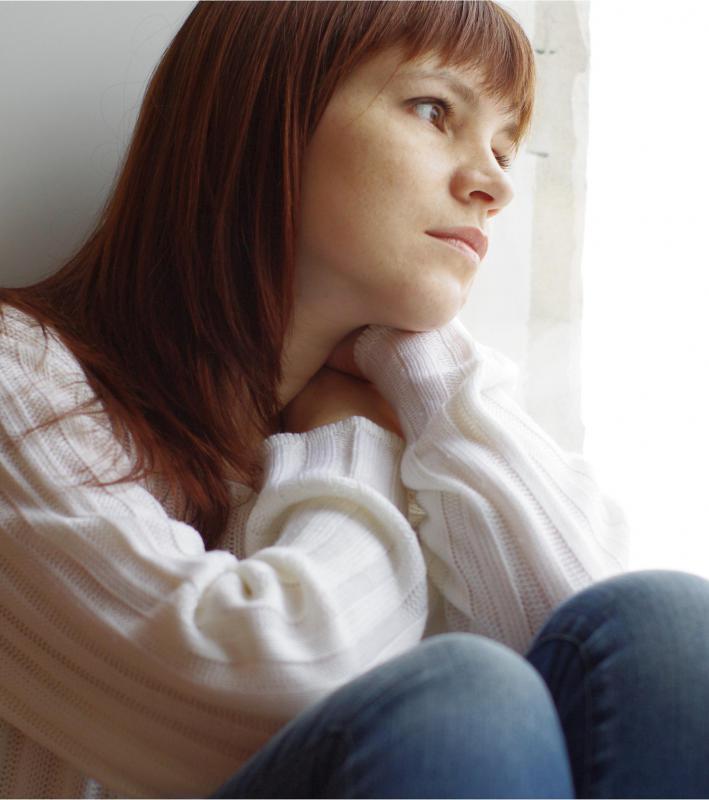At WiseGEEK, we're committed to delivering accurate, trustworthy information. Our expert-authored content is rigorously fact-checked and sourced from credible authorities. Discover how we uphold the highest standards in providing you with reliable knowledge.
What Is the Connection between Cortisone and Depression?
The connection between cortisone and depression is that depression is one of the psychological side effects of steroids such as cortisone. Other psychological side effects are irritability, euphoria and agitation. These effects are particularly evident when high doses of steroids are administered and they may appear within days.
Cortisone and its derivatives are steroids which are effective anti-inflammatory drugs often prescribed for neurological, respiratory, rheumatoid and allergic conditions. While they are a popular and powerful therapy, steroids are associated with both physical and psychological side effects. The link between depression and cortisone as well as the many other mood changes, anxiety, behavioral disturbances and cognitive impairments are little understood and ill defined mainly due to their complexity and unpredictability.

In the past, it was thought that those who suffered from psychological side effects were predisposed to, or already suffering from, a mental disorder such as depression, and cortisone simply exacerbated the condition. More recent studies, however, have shown that this is not so and steroids affect the central nervous system universally. As to why this should vary from a subtle mood change to full-on psychosis is not yet understood. It has been shown that psychological side effects such as euphoria and hypo-mania are more likely with short term treatment and depressive symptoms are more often associated with long term therapy.

The difficulty in studying the connection between cortisone and depression is reflected in the wide variety of study results. While some researchers have found the incidence of steroid-related psychiatric side effects to be under 2%, others have reported the incidence to be over 50%. In an analysis of 11 studies, the average incidence was found to be just under 30%, ranging from mild to severe. Severe psychiatric disturbances was found to average just under 6%. The few studies which have been carried out investigating the response children have to corticosteroids have found that nearly half of those receiving oral cortisone presented adverse psychological effects such as depression and anxiety.

The most significant factor in the connection between cortisone and depression appears to be the dosage. The higher the dosage, the more likely the appearance of side effects with the majority of them occurring early in the therapy. Should cortisone cause mental disorders such as depression, the drug is usually reduced or stopped altogether. However, another link between cortisone and depression is that a rapid or substantial reduction in cortisone may also cause severe changes in mental state. For this reason, care must be taken and the withdrawal closely monitored.
AS FEATURED ON:
AS FEATURED ON:

















Discussion Comments
Cortisone will definitely cause depression, especially if you have had depression and anxiety in the past!
I have Addison's disease and have to take cortisol every day. I am also now suffering from severe depression and OCD. It is believed that high levels of cortisol result in low levels of serotonin which leads to severe depression. There truly is no real replacement for the real thing.
@turkay1-- I think I was already a little depressed when I started getting cortisone treatments and the cortisone made it so much worse. I've had four rounds of cortisone so far, and I am experiencing weight gain and depression from it. It started out with anxiety and mood changes and worsened with every new round of cortisone. I think the weight gain is affecting my self-esteem as well.
I'm going to be off cortisone for a while, so I hope that things will get better. My doctor also put me on an anti-anxiety medication which has made a difference.
If you have a tendency for depression, definitely watch out for it while you're on cortisone. You might want to tell your doctor about it so that he can prescribe a medication or recommend a supplement to help you psychologically. The good part about it is that you know that it's not you, it's the medication. I think that gives me some relief.
@turkay1-- I don't think a single injection can cause depression, it certainly didn't with me. I think depression is more likely for people who have to get cortisone injections every three months for years.
I had a single cortisone injection last year for injury related pain and inflammation. It worked very well, I have been pain free for almost six months now. The only psychological side effects I experienced was moodiness and short temper for a few days after the injection. But it didn't last long.
Will a single injection of cortisone cause depression?
I will be getting a cortisone inject next week for sciatica pain. I've been reading about potential side effects of cortisone and this is the one I'm worried about the most. I have a history of depression and I'm hoping that the cortisone won't trigger another depressive phase for me.
Post your comments